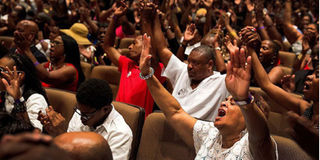Celebrating Jesus, the Lord of time

What you need to know:
New year. Last week, Christians joined the rest of the world to usher in a New Year. Closely celebrated after the birth of Jesus, it is not known to many believers why New Year celebrations are as vital as 25 December that falls a week earlier, Msgr. JOHN WYNAND KATENDE writes.
Christians celebrate New Year’s Day in the context of Christmas because Jesus is the Lord of time. The liturgical Christmas, actually, lasts for 12 days. According to the Jewish background, a child’s birth would not be celebrated until after 8 days, owing to the high rate of infant mortality (some sources). This may partially account for the circumcision of the male child on 8th day.
Our celebration of both festivities is motivated by our inherent yearning for survival. It essentially reveals that God has set eternity in the heart of each person. The day changes normally from one to the other, but, somehow we believe that this change, which will end one year and begin the next, is different. It is similar to the celebration of our birthday anniversaries. We raise a glass to toast and light fireworks. Fireworks are closely associated with Chinese ritual of chasing off evil spirits.
We make New Year’s resolutions in the background of our weaknesses and how we might reduce the vulnerabilities they pose. We step outside the day-to-day activities to reflect, look back, take stock, assess how we did during the past year, and resolve to do better in the next. As Christians, we are no longer slaves to sin, but alive to freedom in Christ (see Galatians 5:1). We value our life, renounce the cult of egoism and resolve to render better service to God and to our neighbour.
Christmas and New Year’s Day are family celebrations. The resolutions we make must, hence, manifest themselves at the level of the family. Married couples resolve to do all they can for the good and happiness of each other. They must build their matrimony on the gospel of Jesus Christ, which is about love, patience and forgiveness. They must parent children according to the ways of God (Luke 2:54). They must resolve to engage themselves deeper into the Church and civic life of the community.
As we celebrate we can trust in God’s good plans for our future. “They are plans for good and not for disaster, to give you a future and a hope.” (Jeremiah 29:11. We realise a transformation that will eventually lead to the full enjoyment of eternal life in the new heavens and new earth. Great is his faithfulness; his mercies begin afresh each day.
As we celebrate, God purifies us from our sin. He imparts new life and implants a new heart in us. Our desires change. We leave behind rebellion and disobedience and enter into a loving relationship with God. The more we grow in Christ, the more we realize how far we have to go. We can learn from our mistakes, but they are in the past and need not to stay there. By maintaining our focus on the goal, we are pulled heavenward (see (Philippians 3:13-14).
Christians are called to be still in the presence of the Lord, and wait patiently for him to act. They are not to worry about evil people who prosper or bother about their wicked schemes (see Psalm 37:7). New Year’s resolutions also commonly include things like treating people better, making new friends, and paying off debts and offer forgiveness. We get more connected with the religions that promise for a happy ending of this life, ushering in another life.
Christmas and the start of a New Year represent new birth; a transformation of who we are. They are celebrated as great time to reflect on the new and living hope we have in the abundant and eternal life of God. Christmas celebrations prompt us to worship God more regularly.


